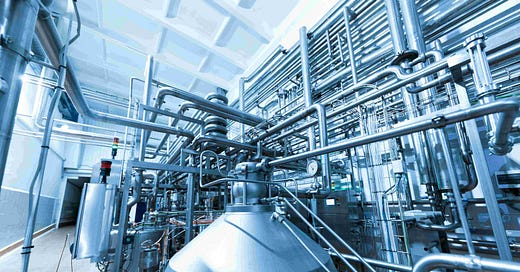Manufacturing Food has a Huge Climate Impact. Solutions are on the Way.
While the environmental impacts of as raising vegetables or animals are often the focus for the climate impacts of food, manufacturing food has a huge impact too. Manufacturers are seeing solutions.
The Climate Impact of Food Manufacturing
The total impact of food and agriculture activities on climate change is indeed well known. They generate up to one-third of all human-caused emissions globally, according to the FAO.
What may be surprising is that the food processing sector is such a large, energy-consuming and CO2-emitting industrial sector. In the US, for example, research by the Pacific Northwest National Laboratory showed that it accounts for about 6 percent of US industrial CO2 emissions. In the UK, Univers said the food processing industry is the largest single manufacturing sector and the fourth largest industrial energy user. The reason is that the sector uses fossil fuels, biomass and electricity for operations such as baking, drying and refrigeration.
CSX similarly noted that food processing and manufacturing can emit carbon through fossil fuel-powered power and heat usage, food packaging production and refrigeration. While packaging might protect food and keep it fresh, it also generates huge amounts of waste. The transport and distribution chain also involves the use of CO2-emitting delivery trucks.
Research in Indonesia similarly found that although industrial food processing plays a crucial role in the global food supply, it faces sustainability challenges that include high energy consumption, excessive waste and greenhouse gas emissions. Researchers said there is an urgent need for innovative solutions such as renewable energy integration, energy recovery systems and non-thermal preservation methods. Advanced technologies such as IoT and AI can optimise operations and reduce energy use.
A large portion of these industrial emissions result from ultra-processed foods (UPF). Researchers at Deakin University in Australia found that UPFs are responsible for significant environmental degradation, driven by both intense production methods and overconsumption. They account for up to 39 percent of diet-related energy use, 36-45 percent of diet-related biodiversity loss, up to one-third of diet-related greenhouse gas emissions, land use and food waste, and up to one-quarter of diet-related water-use.
Solutions to Reduce Emissions
While the problem is huge, Univers said food manufacturers can mitigate the impact of greenhouse gas emissions through practices such as adopting energy-efficient technologies, investing in renewable energy and implementing carbon reduction strategies.
High energy demand in food manufacturing, for instance, is largely due to the need for food preservation, packaging, refrigeration and transportation. Food producers can minimise their energy wastage by investing in technologies such as energy-efficient lighting, motors, heating and cooling systems, energy management systems, and regular energy audits.
ICL observed that food tech actually is enabling manufacturers to adopt advanced methods that optimise resources, reduce environmental impact and enhance food security. Technologies such as AI, precision fermentation, alternative proteins and carbon utilisation to create food ingredients are reshaping how food is produced, processed and consumed. Material recovery technologies also help food companies improve resource utilisation.
AI also plays a crucial role in revolutionising food tech by enabling precision, efficiency, and scalability. It enables process optimisation, acceleration of R&D and creation of innovative ingredients. It also facilitates precision fermentation, a cutting-edge approach to producing specific ingredients such as proteins, enzymes, and fats.
Start-ups Have Solutions for More Efficient Food Production
Giant food processors and multinational conglomerates are beginning to implement better practices. Tetra Pak, for examples, says told Asia Food Journal that it has reduced greenhouse gas emissions by 54 percent and has 94 percent renewable energy consumption.
Across the world, though, start-ups are also at the forefront of creating innovative solutions to reduce carbon emissions from food processing. According to Food Industry Executive, startups are advancing five key technologies in food production: fermentation systems, cell cultivation, molecular analysis, 3D printing and extrusion, and material recovery.
Start-ups in the US are often leaders in this innovation. Nature’s Fynd, for instance, produces Fy protein by using fermentation technology derived from a microbe discovered in Yellowstone National Park.
Perfect Day, which produces animal-free whey protein, has scaled up its precision fermentation technology and has also achieved up to a 99 percent reduction in water consumption compared to traditional dairy processing.
NotCo, known for their its AI platform (Giuseppe) that analyses food at a molecular level, is using the technology to optimise product development and production. Originally based in Chile and now owned by Kraft Heinz, NotCo said its products reduce CO2 emissions by 84 percent and save 78 percent of the water compared to animal-based products.
In Canada, Terra Bioindustries produces proteins and sugars at 50 percent lower emissions from the valorisation of agri-food side streams. Its upcycling platform saves byproducts from landfills and separates components into simple sugars, proteins, oils and more.
In Asia, Bangkok-based Muu’s production process reduces greenhouse gas emissions, land, and water usage by 90 percent compared to traditional dairy farming, TechInAsia said. The startup uses precision fermentation to produce bioidentical milk proteins without using animals.
ScaleUp Bio, founded in 2022, is the first company in Singapore to offer end-to-end contract development and manufacturing organisation services in microbial fermentation from lab to pilot scale. Through precision fermentation, it aims to help clients find new ways to reduce waste and improve resource utilisation in the food industry.
Singapore-headquartered Hydroleap said food and beverage wastewater generated by food and beverage processing plants contains a complex mixture of organic and inorganic substances, including fats, oils, grease, carbohydrates, proteins, vitamins, minerals and trace elements. It uses chemical treatment techniques rather than commonly used approaches such as biological treatment to address specific contaminants in water that cannot be removed effectively through biological or physical processes.
While food production has moved ahead without always considering its climate impact, new processes that increase efficiency and reduce costs as well as carbon emissions look set to reduce the sectors climate impact before long.



